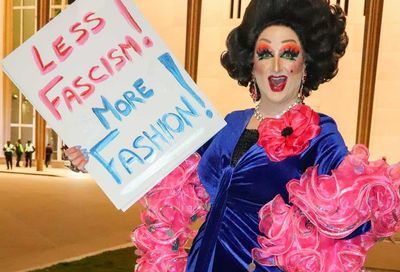Metro Weekly’s Prop 8 Argument Summary
Here’s the FAQ about today’s two-hour oral argument in Perry v. Schwarzenegger, which is now under way before the three-judge panel of the U.S Court of Appeals for the Ninth Circuit.
I am live-tweeting here.
[UPDATE: Below, post-argument and cleaned up, is the summary.]
Standing Argument By Proponents
Charles Cooper, who had led the trial team of the proponents before the trial court, argued today for the proponents. He argued that the proponents had standing to bring the appeal by stating that state law had given proponents standing to defend their proposition.
Smith pointed out that Strauss — the earlier California case — dealt with proponents as agents of the proposition. Here, though, they are acting as agents of the state. Smith: “We’re in a different situation here.”
Earlier, Cooper said, “I don’t have a case for allowing a proponent Article III standing.”
Not good.
Standing Argument By Imperial County
Worse.
Robert Tyler, the lawyer from Advocates for Faith and Freedom, was not even certain whether the clerk in Imperial County was elected or appointed. The question being debated is whether the deputy county clerk has the ability represent county and bring action to defend state law.
Smith asks: If the AG represents the clerks, how could the clerks have standing themselves? Tyler could only respond that they should have standing because no other gov’t party will defend Proposition 8.
Standing Opposition Argument By Plaintiffs
David Boies represents the plaintiffs.
Smith asks Boies if governor and attorney general “nullified, in effect” the decision of the voters by not defending the case. Boies says they’re not nullifying it. Smith: Why? Boies: “No, because they are enforcing it right now.”
Reinhardt, though, says, “Where the governor is not supposed to have a veto … [this] does not seem to [fit] with the initiative system.”
Boies counters: “The fact that there’s no one to defend doesn’t give standing.”
Smith asks, “If they don’t defend it, are they, in fact, not defending the statute?” Boies replies, “That’s a state issue” to be decided by state courts and is not sufficient to create standing.
Reinhardt suggests the Ninth Circuit could send a certified question to the California Supreme Court about whether California law grants proponents standing to defend the enacted initiative, saying, “I don’t see what we lose by [certifying the question].”
Boies said that even if California law gives standing to proponents, that doesn’t necessarily give Article III federal court standing because federal standing is different than state law. Boies also points out the California Supreme Court could have issued a mandate to Gov. Schwarzenegger and A.G. Brown to defend Proposition 8. When given the opportunity to do so, they didn’t.
Constitutional Defense By Proponents
“This is nothing like the racial restrictions in Loving where there was no rational basis whatsoever that could be perceive,” Cooper said.
But Hawkins goes right to the meat, “If California voters approved a racial segregation proposition, would it be unconstitutional?” Cooper concedes that “it would be.”
The test that applies, Cooper says, is rational basis for sexual orientation. He adds, “We believe there clearly is a rational basis.”
Cooper begins talking about the “accidental procreation” or “irresponsible procreation” argument, which more or less says that same-sex couples don’t need marriage — or, at least, that the state needn’t support it — because procreation is always intentional.
Reinhardt replies skeptically, “That sounds like a good argument against divorce. But [what’s that got to do with gay couples]?”
Then, Smith jumps in, asking what the rational basis is for the marriage exclusion if California is giving “homosexual couples” everything else? Cooper replies, “It’s the institution. The word is the institution. … The name of marriage is effectively the institution.”
Cooper is now trying to explain a difference between Proposition 8 and Colorado’s Amendment 2 that was struck down by the Supreme Court in Romer v. Evans, saying Amendment 2 was very broad and that’s why it was struck down. Proposition 8, he says, is narrow.
Cooper, in response to a question about Baker v. Nelson, a 1972 case about same-sex marriage that was dismissed by the Supreme Court “for want of a substantial federal question,” says, “I believe that Baker is binding on this court.” Baker has debatable precedential value, but everyone agrees — even Cooper — that this isn’t Baker because Proposition 8 took away a right after the California Supreme Court said it was protected.
Reinhardt notes, “They took things away in Romer[, too.]” #Prop8
Smith is asking about whether a state that doesn’t have domestic partner benefits has a stronger argument for rational basis, returning to his earlier line of questioning. Cooper says it’s the opposite. Says California has done what it can without “redefining marriage.”
Finally, asked about heightened scrutiny, Cooper says he believes that his case can be won even under heightened scrutiny.
Constitutional Argument By Plaintiffs
Ted Olson spoke for the plaintiffs, saying that the Supreme Court has recognized “the fundamental right of its citizens to marry” — without talking about men and women. Olson says the court has, when discussing marriage, spoken about two particular individuals. In Loving, he says, “it was marriage.”
Reinhardt is talking about “gay marriage.” Olson isn’t having it, and says, “I wouldn’t, Judge Reinhardt, call it gay marriage.”
Reinhardt, though, is trying to figure out whether the court needs to reach the equal protection argument, or whether they can resolve the case under Romer.
Olson says that “You can’t take away that right — which is not just a right of same-sex couples but is a right of all persons.” He states plainly that Proposition 8 is discrimination based on both sex and based on sexual orientation.
Olson hits hard at the proponents’ argument that Proposition 8 is based on an alleged justification that otherwise children would begin hearing about sexuality matters too soon, saying, “That is nonsense.” He later suggested that if that were a legitimate idea, then children would need to be prohibited from watching TV or talking to other children.
Hawkins asks about whether the “accidental procreation” argument can be a rational basis for Proposition 8. Olson replied, “Same-sex marriage is no going to having any effect at all on [straight couples] deciding to have children.”
Getting into the level of scrutiny that Proposition 8 should receive, Olson pushes into immutability, history of discrimination — i.e., heightened scrutiny — then goes back to explaining why the plaintiffs’ view is that the law fails even under rational basis.
Smith volunteers to suggest ideas of rational bases, including “responsible procreation” and that children thrive best being raised by mother and a father.
Olson says that simply doesn’t fit with the facts at trial. He added that the child-rearing argument is invalid because allowing same-sex marriage doesn’t change the circumstances.
Olson says the Hernandez, Levinson, Witt cases outdate High Tech Gays case, in which the aforementioned gays lost. Then, Reinhardt told him that Levinson — about the benefits to be given a federal court employee — wasn’t a case but instead an administrative proceeding, to which Olson quickly replied, “I thought the wisdom in that case was secure your honor.” #Prop8
Reinhardt went on to suggest that a ruling limited to the Proposition 8 circumstances — the repeal of an existing right — could be crafted in this case.
Olson concurred, “You could decide this on the narrow, Romer grounds.” He adds, though: “I don’t think there’s anything in Supreme Court jurisprudence that doesn’t allow you to look at the broader context.”
Olson concluded by explaining, “The rational basis question has to go to the basis of the exclusion, … [and] that’s where the rational basis argument falls down.”
Constitutional Argument By San Francisco
Therese Stewart is up for the San Francisco City Attorney’s Office.
Stewart states that California family law treats gay and straight couples the same and says that the only basis for what proponents argue is that allowing same-sex couples to marry somehow “taints marriage.”
Stewart says the context of the measure and campaign “was bias,” noting — citing cases — that “[p]rejudice … is not always borne of hatred. It may be a simple want of careful reflection.”
Stewart ends big, telling the court, “Equal protection doesn’t allow the state to enact a measure based on a belief that some people are unworthy.”
Support Metro Weekly’s Journalism
These are challenging times for news organizations. And yet it’s crucial we stay active and provide vital resources and information to both our local readers and the world. So won’t you please take a moment and consider supporting Metro Weekly with a membership? For as little as $5 a month, you can help ensure Metro Weekly magazine and MetroWeekly.com remain free, viable resources as we provide the best, most diverse, culturally-resonant LGBTQ coverage in both the D.C. region and around the world. Memberships come with exclusive perks and discounts, your own personal digital delivery of each week’s magazine (and an archive), access to our Member's Lounge when it launches this fall, and exclusive members-only items like Metro Weekly Membership Mugs and Tote Bags! Check out all our membership levels here and please join us today!



















